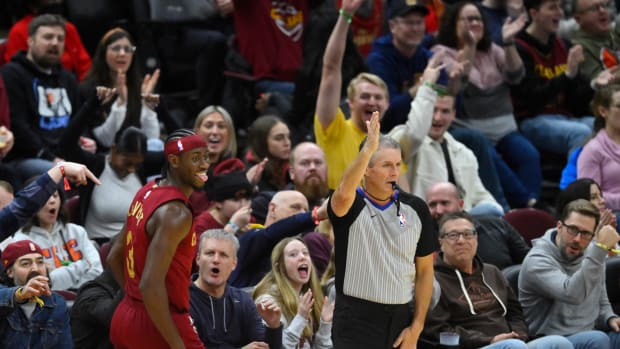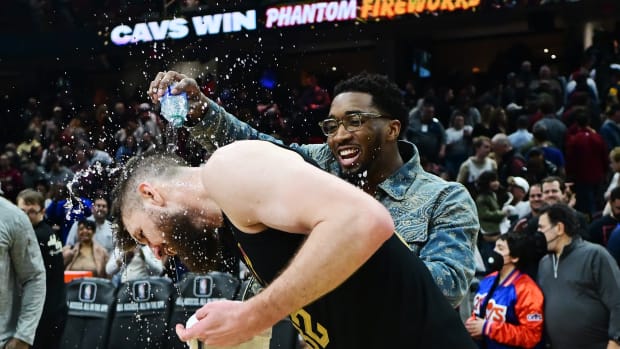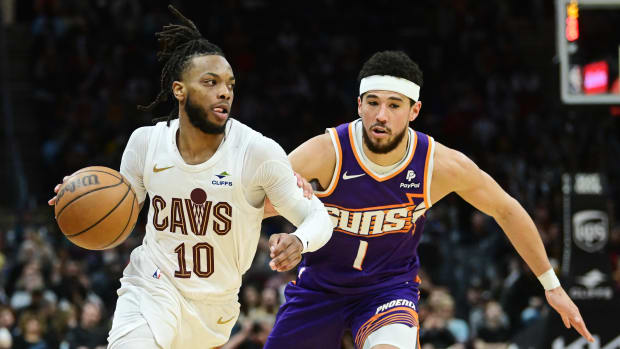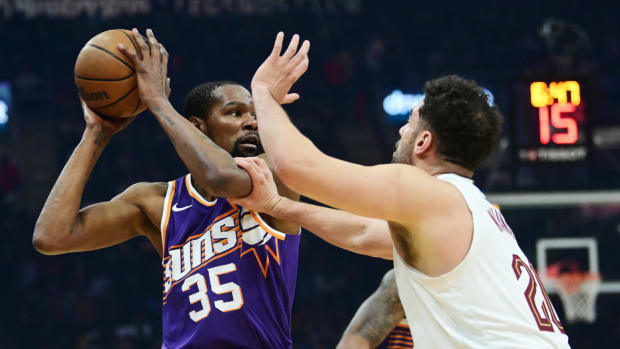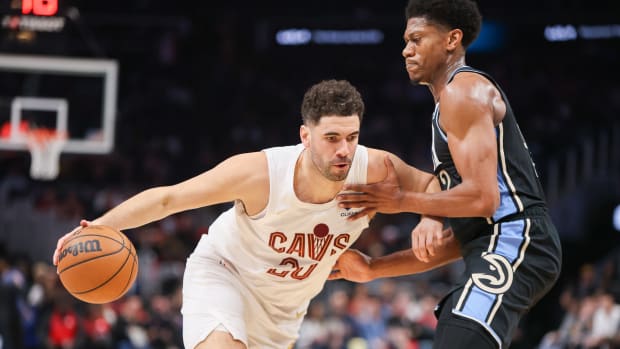Interview: From Ukraine to NBA, Hawks’ Len looks to take big steps
Most people don’t know this, but Atlanta Hawks center Alex Len once saved someone's life.
While he was on vacation in the Dominican Republic someone was drowning. Len was a good swimmer growing up, so he knew what to do when another person got caught by a tide. At first, Len thought it was a joke, but this was far from it. Realizing the severity of the situation, Len jumped into the water and found the unconscious man.
While the others were getting the lifeguard, Len was physically holding the unconscious man above water. Someone that wasn’t as strong as Len might not have been able to help him stay up.
Finally the lifeguard came with a surf board, and the man's life was saved, thanks to Len.
“If I would have probably captured him 20-30 seconds later, or maybe a couple minutes later, he would have been dead,” Len told Amico Hoops.
Before Len told me the story of saving that man's life, he discussed his own personal life story and career while we sat at True Food Kitchen adjacent to Lennox Mall in Atlanta.
On June 27, 2013, then-NBA commissioner, David Stern went to the podium to announce the fifth overall pick, made by the Phoenix Suns. With that high of a draft pick, the player typically selected is a prodigy. Someone who has been on the NBA radar since they were in eighth grade. However, this specific pick announced by Stern would be Len,a 7-footer from the Ukraine. Just a few years ago he didn’t even know he’d be an NBA player, and even more recently, he learned English.
“No chance,” Len told me when I asked if he thought he could be an NBA player at 16-years-old.
BASKETBALL BEGINNINGS
He grew up in Ukraine, a country not necessarily known for it’s basketball roots, and a place that is conflicted with war zones. Thankfully, as an early teen Len transferred to a boarding school seven hours from his hometown, just before some of the conflicts began.
As a kid he didn’t always play basketball, and was playing in one of his first tournaments at 13-years old when a coach spotted him. That coach saw his potential and offered him to come play at the boarding school. The school gave him a scholarship and his mother thought this was his opportunity.
“I basically lived on my own since 13-, 14-years old,” Len said.
A lot of the kids at the school would go home on the weekends. However, Len was seven hours away from his own home. This led to him spending more time working on his game, honing his craft, and ultimately becoming a better basketball player.
“I had nothing to do,” he said. “I was like, 'Man, I’ll just go to the gym and get some shots up.”
This opportunity was something Len felt he had to make the most of. He was at this school for basketball. There were four classes during the day, with practices at night. At first it was tough, but eventually, the school brought in other players from other towns, and those players also stayed on weekends.
Before Len went to the school he didn’t have a bad family or childhood, but it wasn’t the best either. They didn’t have a lot of money. Around the same time he left for boarding school his parents also got divorced. Something he wasn’t happy about, but definitely saw coming.
Len didn’t even get his first pair of basketball shoes until around eighth or ninth grade. Until that point he had been playing basketball in soccer shoes.
“I played seventh grade and eighth grade in basically like soccer kicks,” he said.
He finally got his first pair of basketball shoes when his high-school coach took him to an AND1 store. Essentially the only shoe store in the country that he can remember selling basketball shoes at that time. The coach told him he needed to get the Magic Johnson Converse shoes. Those would end up being his first pair of basketball sneakers.
“I got the Magic Johnson Converse,” he said. “It kind of looked like Jordan Ones.”
HOOPS RADAR
In terms of his basketball fandom there wasn’t a lot of access to NBA games. Len grew up a big Michael Jordan fan while watching old Chicago Bulls games. However, once he started to hit his growth-spurt he began to idolize Kevin Garnett and Tim Duncan. Garnett especially fit the kind of player he would ultimately become; a versatile 7-footer who could shoot the basketball.
There was also no certainty Len would make the NBA at that time -- let alone be the 5th overall pick.
Things began to change when he played well in the U-18 FIBA Tournamnet at just 17-years old. Future NBA players like Rudy Gobert and Jonas Valanciunas were also competing in that same tournament.
“I killed it,” Len said.
Suddenly, he started to serve notice in the basketball world, but the NBA was still a pipe dream.
“I started getting calls from agents, schools started recruiting me like Maryland started hitting me up. Before that it was so quiet.”
Now the focus would be getting the United States, because there was a better chance to make the NBA.
”In America it’s all about exposure or hype,” he said.
COLLEGE START
Even with the extra attention, colleges weren’t lining up to offer him a scholarship. However, the University of Maryland, one of the premier basketball schools, did show extreme interest. Maryland mostly recruited Len via Facebook, and he had to translate the messages form English to Russian to read them.
They were the only school that was recruiting him, but suddenly he would learn about one of the worst sides of amateur athletics in America -- as the coaching staff that recruited him to Maryland decided to leave. Gary Williams retired, and the assistant coach that led Len's recruiting left for Virginia Tech.
After months of being told that Len should come to Maryland, he was then told by the same coach why he should go to Virginia Tech. He was already sold on Maryland regardless of the coaching change, but did visit Virginia Tech out of respect.
“Maryland was just a better fit,” Len said.
Unfortunately, for reasons he couldn’t control, things didn’t get off to a great start in America.
Len had played professionally back at home, but he wasn’t pocketing any of the money. The money that he made was so little, that he spent it all on his rent and food. It was for survival. However, the NCAA has strict rules about accepting any money in or before college.
They would eventually agree to let him play, but they came up with a way for him to give the money that he made professionally back through giving it to a charity, monthly. This agreement essentially was a way for him to return any money he had made, and regain their strictly enforced amateur status. On the contrary, this would drastically hurt him personally. He needed the money from his scholarship check.
“It still kind of hurt me,” he said. “I didn’t have enough money to spend. Whatever I was getting I had to give to the charity.”
He ended up getting just a 10-game suspension. In the harsh rules of the NCAA, this was actually a blessing. He would be able to continue his basketball career, and education at Maryland without trouble.
Meanwhile, this whole time he still didn’t even know how to speak English.
COMMUNICATION BARRIER
There was always a feeling of anxiety. Len couldn’t express himself, because he didn’t know the right words. Ordering food was even a struggle with the language barrier.
His climb to the top took a lot of perseverance.
“It took me about a year and a half to pick up how you structure words,” he said.
Mastering the English language ultimately took Len a couple years before he got totally comfortable. Something no one would know when talking to him today. He speaks the language so fluently.
There were teammates in college that obviously only spoke to him English, and he also found a girlfriend on campus. Eventually, he just had to learn the language. That doesn’t mean that there were not bumps in the road his freshman season, which was also his first year in America. He would occasionally mess up plays on the court. He couldn’t help it. Not knowing English affected his play early on.
At that point he still was not a legitimate NBA prospect, and one could totally understand. There were a lot of things outside of basketball he was obviously having to navigate through.
Thankfully, that summer everything started to click. He became better at English, he had a full season to focus without any complications from the NCAA, and he also saw players he thought he was better than get drafted.
He became comfortable.
SHOWING GROWTH
During his second season he averaged 11.9 points, 7.8 rebounds, and 2.1 blocks in just 26 minutes per game. The decision to leave was not as easy as one might think, but there was a clear opportunity to be a first-round pick. At one point during Len's fantastic sophomore season he got hurt, and did not want to risk another injury hampering his career or draft stock.
Eventually, he made the decision to declare for the NBA Draft, and the 7-footer who came to the school without knowledge of English, hungry at times, and new to America, was now a highly coveted player within NBA circles. Stern went to the podium and announced the Suns had selected him with the fifth overall pick.
In just a few months the Ukrainian who didn’t even get his first pair of basketball shoes until he was a teenager would become a multi-millionaire.
“I thought a million dollars, you could live forever,” he said.
He thought that he was set for life, until they went house shopping.
He realized that he couldn’t even buy a house in cash yet. His salary was over $3 million per season, but that’s not paid in a lump sum, and there were taxes, a car, living expenses. He suddenly had more money than he could ever imagine, but he also realized how far that money could take him -- which, at that point, wasn’t that far. However, his mom would be taken care of and money would no longer be an issue.
He did make one big first purchase that was symbolic.
“I always dreamed of a black BMW,” he said.
Back in Ukraine, if someone drives a BMW it is the ultimate status of money. Purchasing a BMW was a big moment in his life. He was also able to bring his mother with him to America.
ON THE JOB
NBA life is lavish, but now the real work would begin. Playing at the highest level in the world, and carrying the the high expectations of being a top-five draft pick. Being drafted to the Phoenix Suns at that time wasn’t the worst thing in the world. They won 48 games his rookie season and almost made the playoffs in the ultra-competitive Western Conference. If they had played in the East, they would have been a playoff team with home-court advantage.
Len's struggles in Phoenix hadn’t begun just yet and he was on a solid basketball team with good veterans -- Goran Dragic, P.J. Tucker, Eric Bledsoe and twins Marcus and Markieff Morris. They were an entertaining, highly competitive basketball team.
Things would unfortunately get worse almost every season. His last three seasons with the team they never won more than 24 games. There were also coaching-changes every year and a half. Not too mention they also signed Tyson Chandler to a $50 million contract during Len’s 3rd season. Chandler played the same exact position as him, and while he was a great veteran to Len; he took minutes away.
“My first three years, I loved the Suns,” Len said. “I loved everything about the team.”
There were high hopes to make the playoffs, and build off of the last two seasons, where the team had won 40-plus games. However, that third season they won just 23 games and that’s when things started to fall apart for the once promising team.
Len also saw his minutes decrease his final two seasons on the team. At that point there was never a consistent point guard who knew the plays or could find chemistry with the big man. Len is loyal, so while there was never a trade request, he definitely regrets not looking for a fresh start somewhere else.
“I wish I would have left after that third year,” he said.
When a player is picked in the first round there are expectations, but when a player is picked in the top five there are expectations. He never got the chance to show the player that he could be, and at that point there becomes self-doubt. Some might even call a player a bust; fairly or unfairly.
“It was disappointing,” he said.
Phoenix was an almost impossible position for him to shine.
HAWKS TALK
Len excelled in his first season with the Hawks this past year. The opportunity was finally there to be the player that he knew he could be.
Averaging a career high 11.1 points per game, and shooting 36 percent from three in just 20 minutes a game was a huge turnaround for him. After the All-Star break he shot an outstanding 41 percent from three. He’s 7-1. That is exactly the type of big-man the modern-day NBA so desperately covets.
The Hawks only won 29 games, but anyone who watched or spent time around the team could see the promise. They had to go through growing pains, because everyone from the players, coaches, and training staff are all fairly new.
Yet the Hawks finished the season on a respectable 10-13 stretch, when all of the bad teams are tanking, and cement themselves as one of the more entertaining teams in all of basketball.
“Everybody just came together,” Len said.
This team fit everything that he needed for a fresh start.
Finally, his star potential was put on display. In fact, Len is still young enough to fit in with the rest of the young core -- Trae Young, John Collins, and Kevin Huerter are all extremely young, but Len too is just 25. This is a place that he could see as his home for the foreseeable future. Right now he wants to prove to the franchise that he can be the starting center.
Len goes to the practice facility every day during the summer these days.
“That’s why I’m here everyday, trying to prove myself,” he said.
The goal is to get his 3-point shot to a 40 percent clip for the entire season, and continue to show his versatility with ball-handling and finishing around the rim. There is also a budding chemistry with the team’s point guard, Young who Len believes should the Rookie of The Year.
“He’s amazing,” Len said.
This past season was a year of revival for him. While he’s still young this was already his sixth season. He’s approaching his seventh, and he’s happy.
“I love it,” he said. “The happiest I’ve been in a while.”
The best part?
He got his confidence back.
”I can be that player, 20 and 10 every night,” he said.
